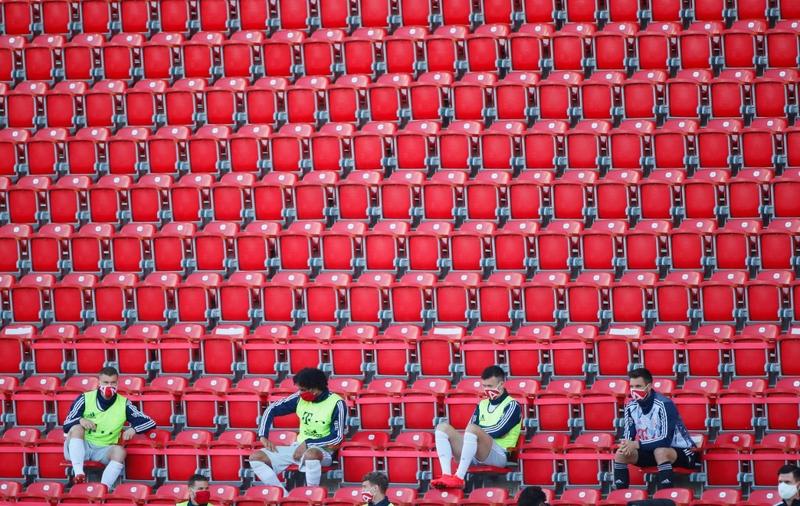 Bayern Munich substitutes wearing protective face masks maintain social distance in the stands during the German first division Bundesliga football match FC Union Berlin v FC Bayern Munich on May 17, 2020 in Berlin, Germany as the season resumed following a two-month absence due to the novel coronavirus COVID-19 pandemic. (HANNIBAL HANSCHKE / POOL / AFP)
Bayern Munich substitutes wearing protective face masks maintain social distance in the stands during the German first division Bundesliga football match FC Union Berlin v FC Bayern Munich on May 17, 2020 in Berlin, Germany as the season resumed following a two-month absence due to the novel coronavirus COVID-19 pandemic. (HANNIBAL HANSCHKE / POOL / AFP)
BERLIN-From social-distancing substitutes using airport stairs, to disinfected balls and a potential television audience of one billion, the Bundesliga enjoyed a checkered restart as the first major sports league to resume amid the COVID-19 pandemic.
The Bundesliga games sounded more like Sunday kickabouts than the return to action of highly paid professionals in the world's best-attended soccer league with normally has an average of 42,000 spectators per game
German soccer's top two divisions, suspended since mid-March due to the coronavirus, returned on Saturday with a schedule that included the high-profile Ruhr Valley derby between Borussia Dortmund and Schalke-as soccer-starved fans around the world tuned in to watch live action.
Despite an anticipated global television audience of one billion as predicted by Bayern Munich boss Karl-Heinz Rummenigge, and the hope it gave other sports leagues, it was not what fans had been hoping for and games suffered a scrappy start as players, lacking match practice, tried to adapt to the new conditions.
With a poll for German state broadcaster ARD showing 56 percent of Germans consider restarting at this stage to be wrong, the league knows any violation of the agreed rules could lead to another suspension that may be financially fatal for some clubs.
ALSO READ: Eerie silence across stadiums as Bundesliga restarts
Instead of an 81,000 crowd packing into Dortmund's Signal Iduna Park, it was a mere 300 people, including the players, staff, team officials, broadcasters and security personnel, as in every stadium, as part of a strict health protocol.
Every shout, scream and thud of the ball bounced off the concrete stands and was picked up by the pitch-side microphones to create a haunting atmosphere.
In Dortmund, Europe's biggest standing tribune, the Yellow Wall, was impressively empty as the latest episode of the fiercest German soccer rivalry unfolded on the pitch with the host crushing Schalke 4-0.
Dortmund CEO Hans-Joachim Watzke thought the situation was very strange.
"It is a bit surreal when two hours before kickoff you get messages from across the world that they are sitting in front of TVs ready to watch the game and then you drive through your own city and there is nothing happening," said Watzke, whose second-place team trails Bayern Munich by four points.
The games sounded more like Sunday kickabouts than the return to action of highly paid professionals in the world's best-attended soccer league with normally has an average of 42,000 spectators per game.
Bayern forward Thomas Mueller said the atmosphere during his team's 2-0 win at Union Berlin on Sunday reminded him of "old men's games played in the afternoon".
"Obviously, it's sad the fans cannot watch the game, that we can't meet up and go to the game and play this game together," Freiburg coach Christian Streich said after his team's 1-1 draw at title hopeful RB Leipzig.
"This is not something that can go on indefinitely. But under these conditions I did not expect a drop in quality because of a lack of fans and we did not see that."
With the Bundesliga desperate to complete the season for contractual reasons by June 30, it has been keen to get games played despite the unusual circumstances.
Police were present at the grounds prior to games kicking off in order to deter fans from gathering outside to celebrate.
READ MORE: Germany's restart the litmus test for European soccer?
"Make it easy for us and stay at home," Dortmund police said before the game. Fans did stay away from the derby, while inside the stadiums masks were mandatory for everyone apart from the players.
Teams had to change their routines completely, with Leipzig having brought in a set of airport stairs to keep substitutes at a distance in the stands some three meters higher up than the bench.
The Bundesliga has allowed five substitutions in total per game to help players cope due to the lack of match practice and the congested fixture schedule, with Schalke becoming the first team in Bundesliga history to make use of the temporary measure.


